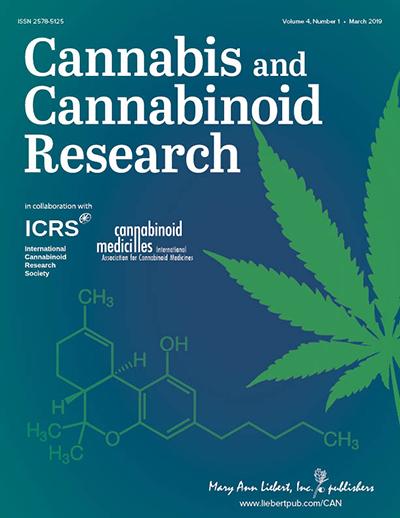
Credit: ©2012, Mary Ann Liebert, Inc., publishers
New Rochelle, NY, May 30, 2019–The body’s endocannabinoid system, due to the critical role it plays in regulating neurotransmitter signaling, is an enticing target for drug development against disorders associated with anxiety, stress, and repetitive behaviors, such as obsessive-compulsive disorder (OCD). A comprehensive new review article that provides an overview of this complex system, endogenous and exogenous cannabinoids, results of animal studies and human trials to date, and recommendations for future directions is published in Cannabis and Cannabinoid Research, a peer-reviewed journal from Mary Ann Liebert, Inc., publishers. Click here to read the full-text article free on the Cannabis and Cannabinoid Research website through June 30, 2019.
The article entitled “The Endocannabinoid System: A New Treatment Target for Obsessive Compulsive Disorder?” was coauthored by Reilly Kayser, MD, Ivar Snorrasson, PhD, Margaret Haney, PhD, and H. Blair Simpson, MD, PhD, Columbia University Vagelos College of Physicians and Surgeons, and Francis Lee, MD, PhD, Weill Cornell Medical College, (New York, NY). The researchers present the evidence that links the endocannabinoid system to the pathology underlying OCD. They also explore the potential for targeting this system to relieve symptoms of OCD and related disorders such as anxiety, tic, and impulse control disorders. The review includes and extensive overview of cannabinoids made by the body, and exogenous cannabinoids, including phytocannabinoids found in the marijuana plant and purified and synthetic cannabinoids.
Based on both animal study data showing anti-anxiety and anti-compulsive effects of cannabinoid agents and on preliminary human clinical trial data, the authors suggest that continued pharmaceutical development is warranted. Which cannabinoid agents to test and how to measure their effects will be among the important questions to consider in designing future studies.
“Is there a place for cannabinoid-based medicines in psychiatry? Evidence from animal and human studies points to the endocannabinoid system as an important regulator of emotionality, but how can we exploit this knowledge for therapy? This review article offers a critical assessment of the evidence, focused on obsessive compulsive disorder, and clues to future research,” says Editor-in-Chief Daniele Piomelli, PhD, University of California-Irvine, School of Medicine.
###
About the Journal
Cannabis and Cannabinoid Research is the only peer-reviewed journal dedicated to the scientific, medical, and psychosocial exploration of clinical cannabis, cannabinoids, and the biochemical mechanisms of endocannabinoids. Published quarterly in print and online and led by Editor-in-Chief Daniele Piomelli, PhD, the Journal publishes a broad range of human and animal studies including basic and translational research; clinical studies; behavioral, social, and epidemiological issues; and ethical, legal, and regulatory controversies. Complete tables of content and a sample issue is available on the Cannabis and Cannabinoid Research website.
About the Publisher
Mary Ann Liebert, Inc., publishers is a privately held, fully integrated media company known for establishing authoritative peer-reviewed journals in many promising areas of science and biomedical research, including Journal of Palliative Medicine, The Journal of Alternative and Complementary Medicine, and Journal of Child and Adolescent Psychopharmacology. Its biotechnology trade magazine, GEN (Genetic Engineering & Biotechnology News), was the first in its field and is today the industry’s most widely read publication worldwide. A complete list of the firm’s 80 journals, books, and newsmagazines is available on the Mary Ann Liebert, Inc., publishers website.
Media Contact
Kathryn Ryan
[email protected]




